DUBAI: Just days before he heads to the UN Climate Conference (COP26) in Glasgow, US President Joe Biden’s climate agenda is in danger because of infighting between progressives and moderates within his own Democratic Party in Congress.
The fight is over his domestic agenda presented in two bills: A social spending bill, referred to as Building Back Better; and a $1.2 trillion infrastructure bill which cleared the US Senate earlier this year. Both are considered legacy-leaving actions by the president, but one of them contains the most significant climate action ever taken by a US leader.
House Speaker Nancy Pelosi sounded optimistic over a deal between Democrats over the weekend, when the president met with Congressional leaders over his agenda, but nothing is in the bag yet. Pelosi said that Democrats are very close to a deal on the two bills. “I think we’re pretty much there now,” she told CNN on Sunday.
The original social spending bill of Biden, which includes the climate provisions section, began as a $3.5 trillion package, but the bill that is being negotiated now is much lower because of fierce opposition from moderate Democrats.
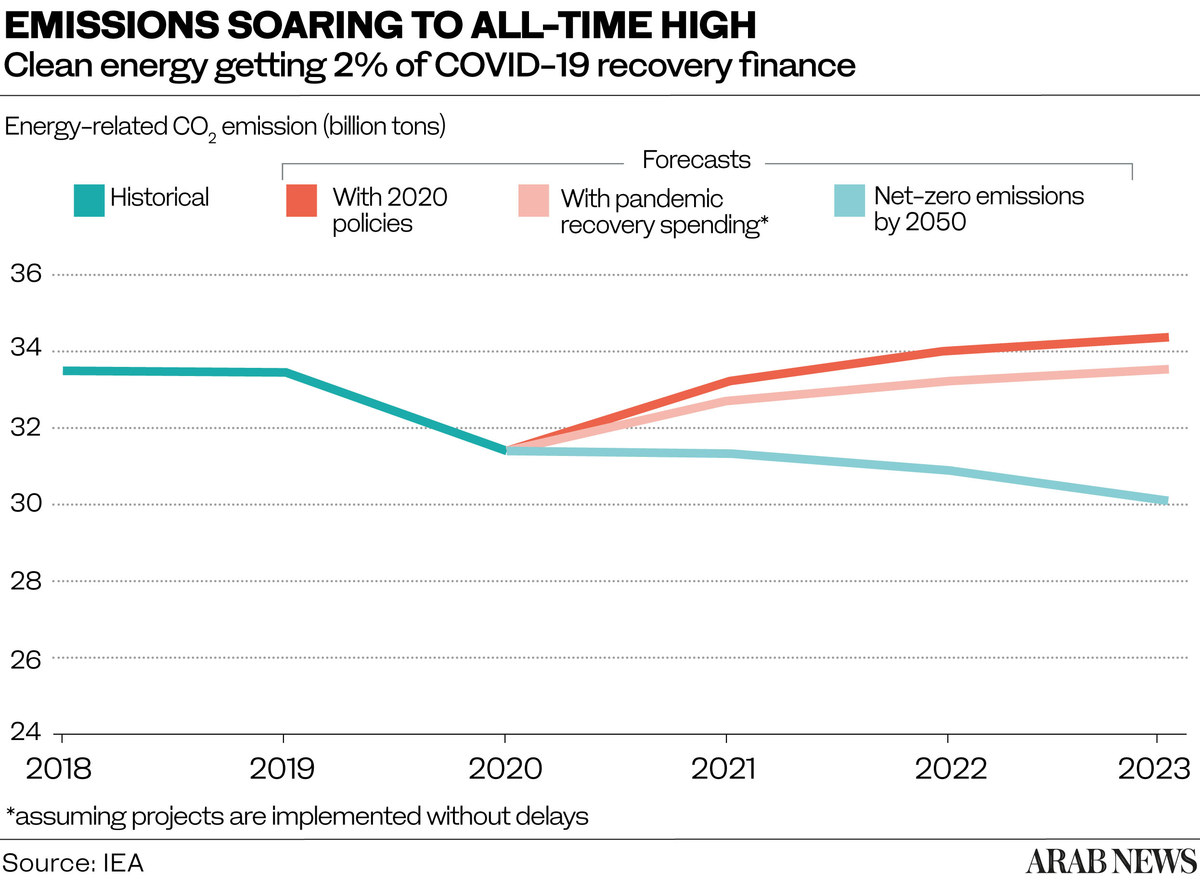
Two senators hold the key to reaching a deal over the bills and to a strong US position at COP26. The US can either lead with very ambitious position — or temper the high expectations of the summit if the two Democrats succeed in scaling down the president’s agenda in the spending bills.
The US is believed to have “contributed more to global warming than any other nation,” as The New York Times said, and if the US arrives at COP26 with a modest domestic plan to cut emissions it will make it harder to convince other polluters to cut their own emissions.
Sen. Sheldon Whitehouse told The Guardian newspaper that the US “will look ridiculous if they show up with nothing.”
This is also a make-it-or-break-it moment for the president and the Democrats, for they might never have another opportunity to pass their agenda, including their climate policy.
They now control both houses of Congress, and although it is a razor-thin majority in the Senate, they might not have this opportunity again if they do not win big in the 2022 Congressional elections.
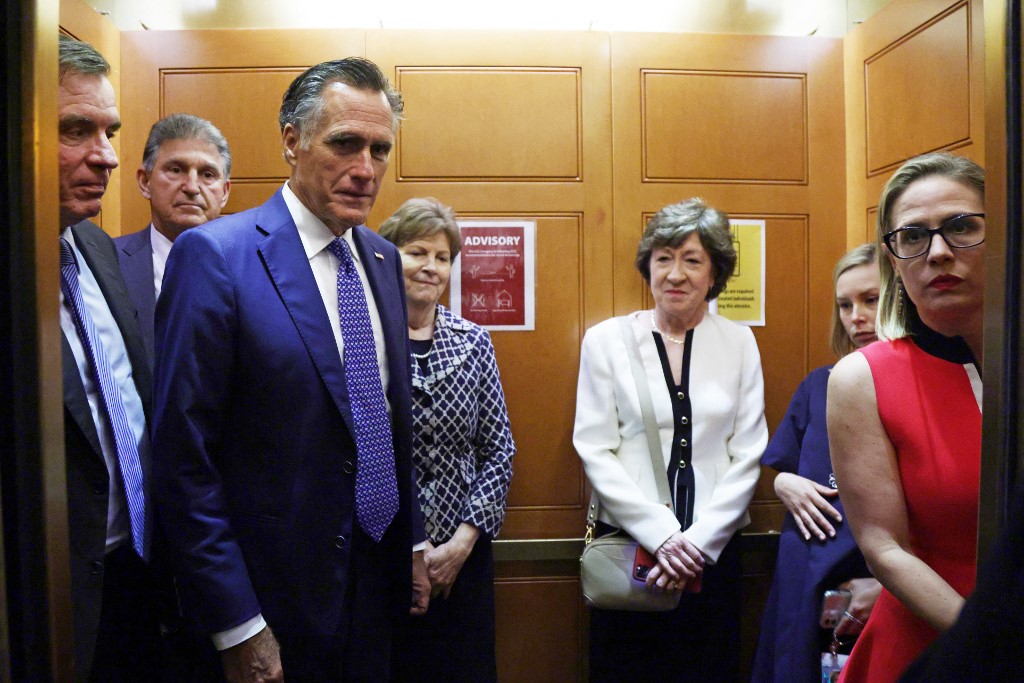
(L-R): US Senators Mark Warner (D-VA), Joe Manchin (D-WV), Mitt Romney (R-UT), Jeanne Shaheen (D-NH), Susan Collins (R-ME) and Kyrsten Sinema (D-AZ) take a break from a meeting on infrastructure for going to a vote at the US Capitol. (AFP/File Photo)
The Senate is equally split now, giving each senator veto power over the budget and any policy decision, with the situation effectively making every senator “a president,” as Biden has put it.
Biden’s domestic agenda, including climate, is dependent on an agreement being reached within his own party this week, not only to preserve his legacy but also to guarantee Democrats a chance to keep power for another term in the next elections.
The majority of the Democrats agree with Pelosi that the bill that Congress is discussing is transformational and historic, and they liken it to the New Deal, the programs enacted by Roosevelt after the Great Depression. However, they have not been able to convince the two senators to toe the party line and end their opposition to the bills.
Joe Manchin III and Kyrsten Sinema are not only opposing Biden’s bills, but also threatening his domestic policy plan. They have been so dogged in their opposition as to prompt a prominent Democratic senator like Bernie Sanders to claim that it is “simply not fair, not right that one or two senators say: My way or the highway.”
Although they are both holding off on any breakthrough on reaching a deal, the objectives of Manchin and Sinema are not identical.
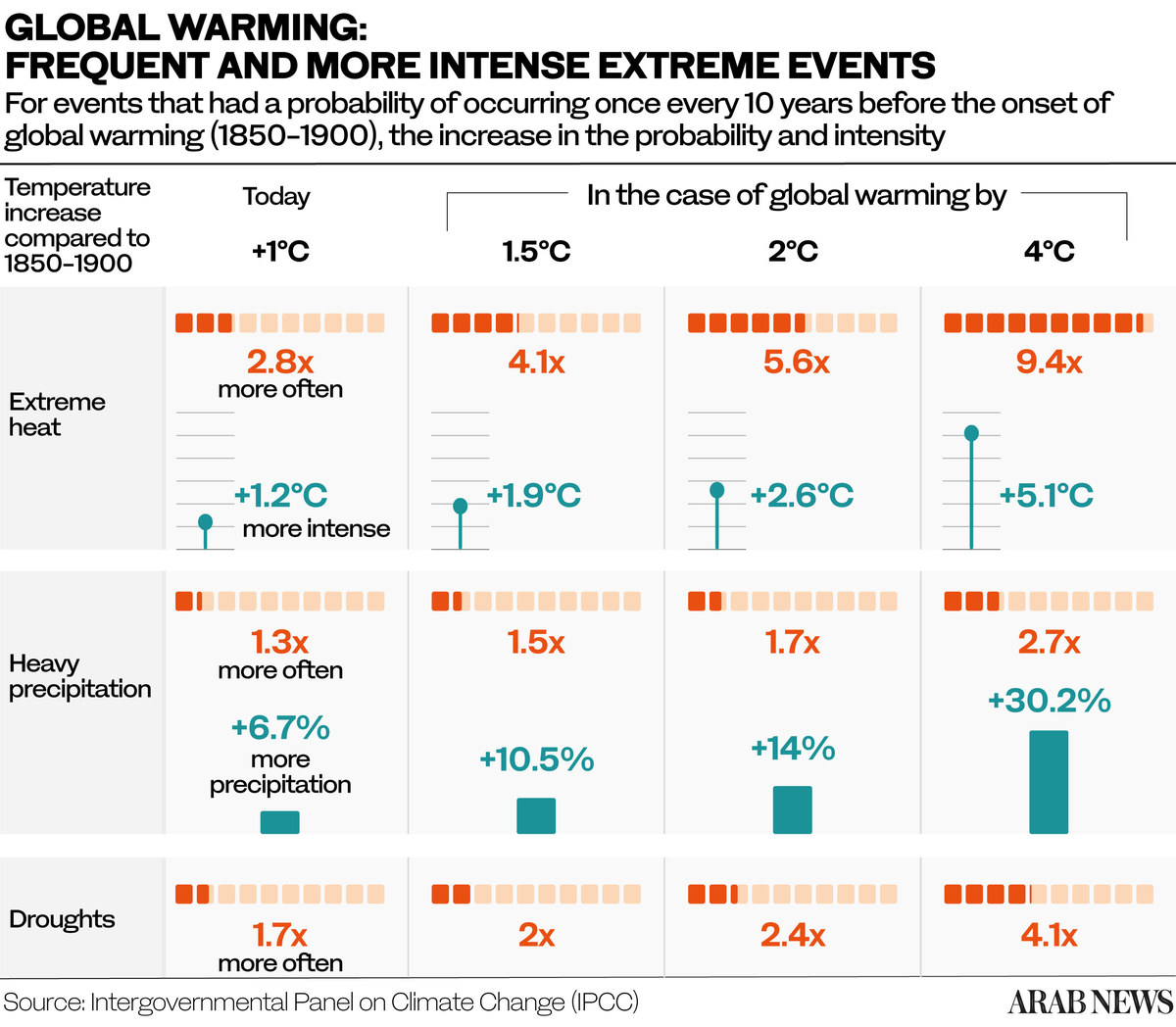
Manchin, from a coal-dependent state, West Virginia, has expressed concern over rising inflation because of the size of the package and its cost, but in practical terms, it is politics that is mainly on his mind.
His state and constituents depend on coal for economic survival; entire towns might cease to exist if West Virginia’s coal mines are shut down. The state also depends on coal-fired plants for 91 percent of its electricity production.
Manchin wants the $3.5 trillion price tag of the president’s bill to be cut in half to $1.5 trillion.
He is not in favor of one aspect of Biden’s climate change agenda — the part that seeks to encourage transition to clean energy. He said that energy companies are” already making the transition” to greener technologies and thus do not need tax credits and incentives.
Sinema, by contrast, is rather vague on what she wants in the package and what she opposes. US news media has reported that she supports new programs to promote clean energy and penalize businesses, but also wants to tax the rich.
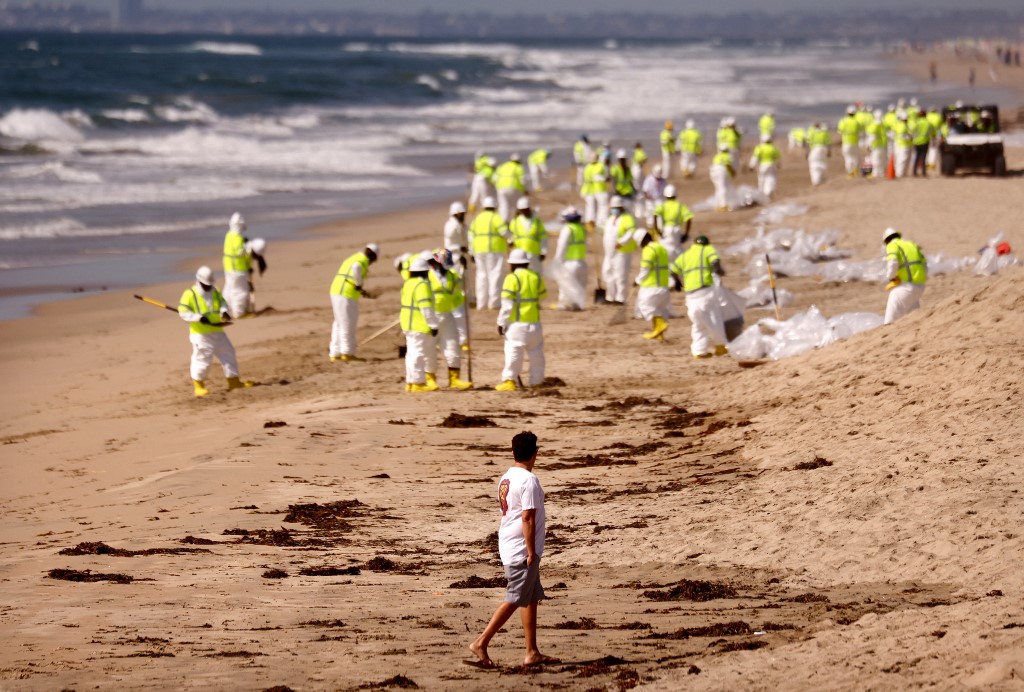
A beachgoer watches as cleanup workers search for contaminated sand and seaweed along the mostly empty Huntington Beach about one week after an oil spill from an offshore oil platform on October 9, 2021 in California. (AFP/File Photo)
Biden has spent hours meeting with congressional members of his party, especially Manchin and Sinema, in an attempt to convince them to back him before he travels to Europe for COP26 the end of the month.
Climate change is a high-priority issue for Biden and his administration. He made this clear when he signed an executive order for the US to rejoin the Paris Agreement the day he took office.
He considers climate change “everybody’s crisis,” and has called on the US to be serious about the “code red” danger of global warming. He has put his fight against climate change in the context of saving the planet, while his administration has framed it as a national security threat and an integral part of its foreign policy agenda.
This concern about climate change is shared by the US public — but along partisan lines.
Polls show that the climate provisions are very important to Democrat voters. One poll by the Associated Press-NORC Center for Public Affairs Research found that 83 percent of Democrats are very concerned about climate change. Such sentiments are not shared by the Republicans, of whom only 21 percent said that they are concerned.
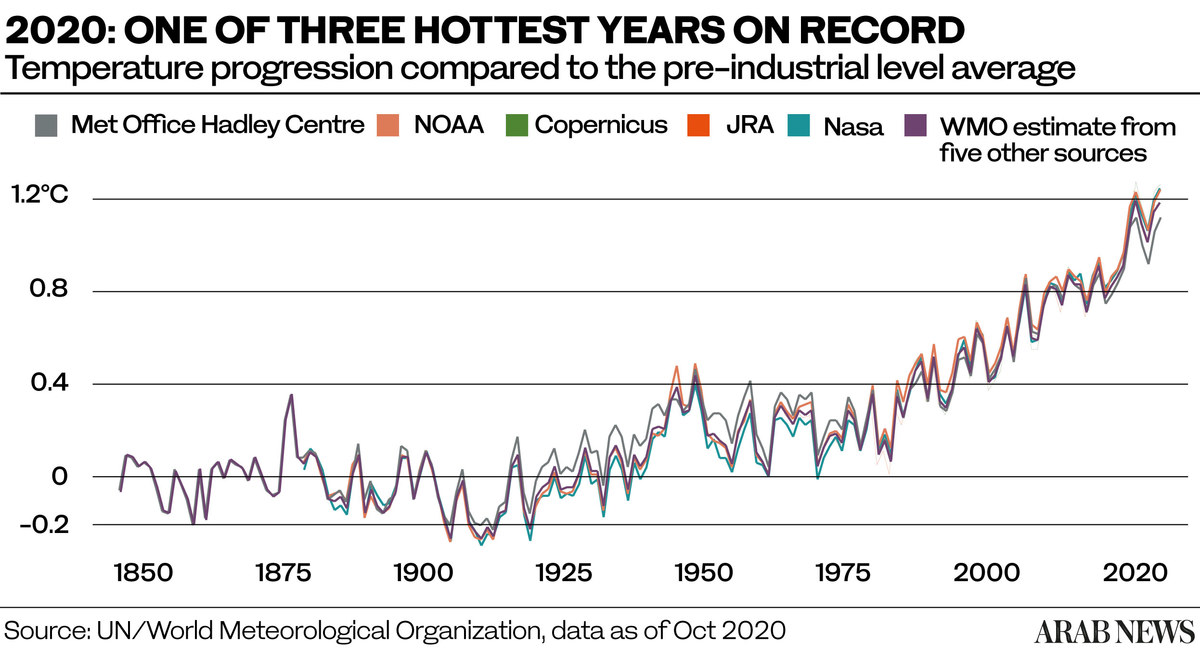
When the president put his full weight behind his two bills, it amounted to a whole-of-government approach to the climate part of his agenda. Lobbying for climate action got a boost when the White House, Pentagon and the intelligence community put out two reports linking climate change and global security risks.
The Washington Post said: “Together, the reports show a deepening concern within the US security establishment that the shifts unleashed by climate change can reshape US strategic interests, offer new opportunities to rivals such as China, and increase instability in nuclear states such as North Korea and Pakistan.”
The Pentagon is reportedly incorporating “climate issues into its security strategy,” and is worried “that climate change could lead to state failure,” according to the newspaper.
Secretary of Defense Lloyd Austin said in a statement: “Climate change is altering the strategic landscape and shaping the security environment, posing complex threats to the US and nations around the world.”
Austin considers it important for the Department of Defense to understand the way that climate change affects missions and capabilities if the US wants to protect itself and deter war.
Another report, The Financial Stability Oversight, cited by Axios, referred to climate change as an “emerging threat” to US economic stability, adding that the administration is “factoring climate risk into planning at the Department of the Treasury.”
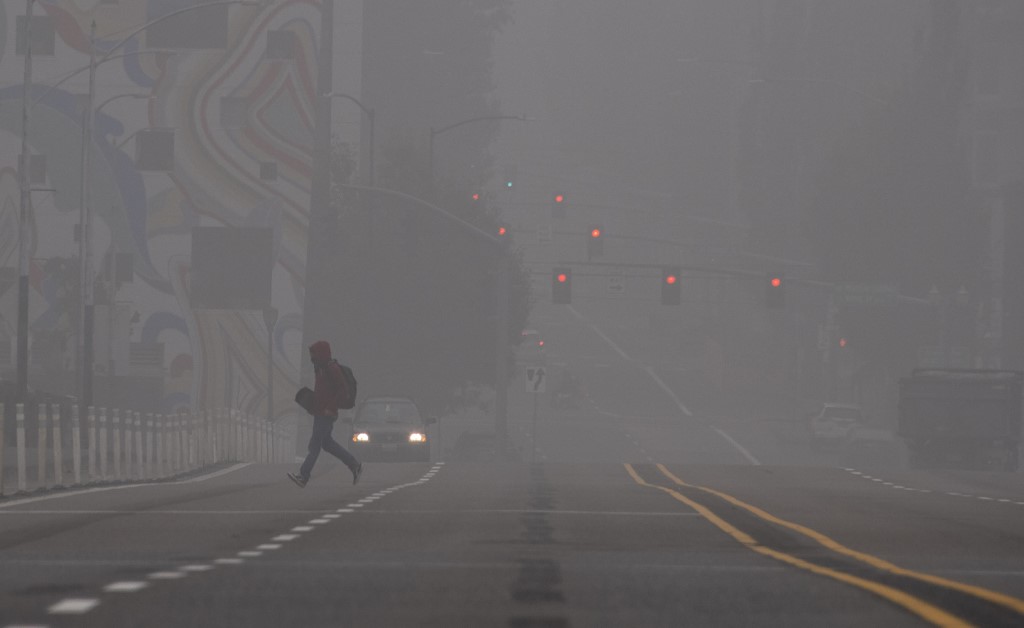
A man crosses a street in downtown Portland, Oregon where air quality due to smoke from wildfires was measured to be amongst the worst in the world, September 14, 2020. (AFP/File Photo)
The FSOC, headed by Janet Yellen, “views climate related financial risks as an emerging threat to the financial stability of the US.” All these efforts by the administration and its departments were seen by the media as “warning measures” before the UN conference.
The Democrats are negotiating over a smaller package now and Biden has reportedly told party members that a package of up to $1.9 trillion is now the goal of the negotiations.
Other reports put the number at $2 trillion. Although this is a much smaller package than the originally proposed $3.5 trillion, it is closer to what Manchin wants and has a better chance of being accepted.
Despite the reductions, Biden has said that the Democrats are keeping the climate provisions in the infrastructure bill regardless of the opposition from Manchin.
There are also reports that a key component of Biden’s climate agenda, the Clean Electricity Performance Program, has been dropped from the final version of the budget bill. The $150 billion program, which is designed to replace coal-and gas-fired power plants with wind, solar and nuclear energy, is opposed by Manchin.
If the reports are true, the setback to President Biden’s climate policy and ambitions for the Glasgow conference would be huge. The program could “account for 42 percent of emissions reduction targets when tax credits are included,” according to news reports.
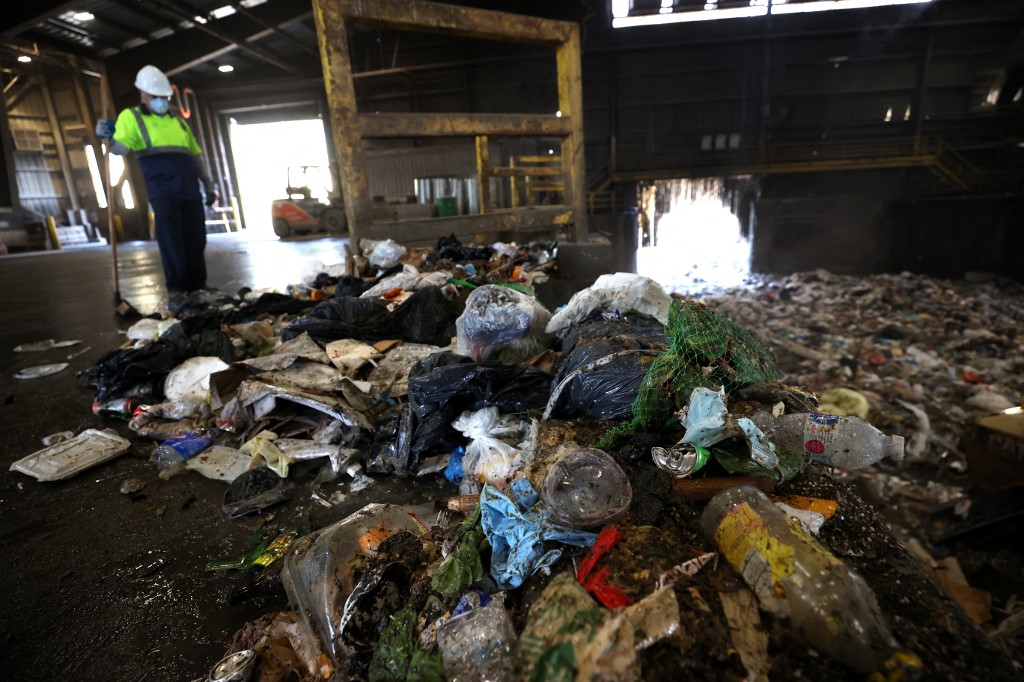
Discarded personal protective equipment (PPE) sits in a pile of trash in a trash pit at Recology on April 2, 2021 in San Francisco. (AFP/File Photo)
John Kerry, the US special presidential envoy for climate, was quoted by the Associated Press news agency as saying that any “Glasgow setback would carry reputational risk matching that of former president Donald Trump pulling out of the Paris Agreement again.”
Biden met with Manchin and Senate Majority Leader Chuck Schumer last Sunday in Delaware to try to reach a compromise. The negotiations are about what to cut and what to keep in the reconciliation bill, and how to pay for it. They are hoping to clinch a deal this coming Wednesday.
The numbers are getting closer to what Manchin wants. But while progress has been made as the White House said, the deal is not a sure bet yet. Until that happens and Congress votes on the bills, the US position in COP26 will remain tenuous.
COP26 in Glasgow was supposed to be the “America is back” moment on climate. It is important for the world to have the US back, especially on climate action, but if Biden arrives empty-handed there will be little hope for a breakthrough.
The summit might not deliver on a global emergency that has the slogan “our house is on fire.” The international fire brigade will be coming to put out the fire without the fire extinguishers. No one at the Glasgow conference will take their fire-fighting efforts seriously.
This is why the Democrats have to get their act together and unite on this. It is their only chance to “save the planet” — something Biden says he wants to do.















